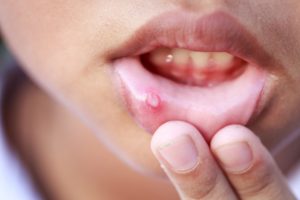 A canker sore seems like it would be a small problem…until you have one. Then it’s all you can think about! Suddenly, brushing your teeth, having acidic foods or beverages like orange juice, and even enunciating your words becomes a lot more difficult. But what are canker sores in the first place? Are they harmful and should you have them looked at by a dentist? In this blog, you’ll get answers to those questions and find out how to prevent and treat this common (but painful) condition.
A canker sore seems like it would be a small problem…until you have one. Then it’s all you can think about! Suddenly, brushing your teeth, having acidic foods or beverages like orange juice, and even enunciating your words becomes a lot more difficult. But what are canker sores in the first place? Are they harmful and should you have them looked at by a dentist? In this blog, you’ll get answers to those questions and find out how to prevent and treat this common (but painful) condition.
What Are Canker Sores?
Canker sores are actually tiny, oval-shaped ulcers (called aphthous ulcers) that can occur on your tongue, gums, the inside of your lips, and other soft tissues in your mouth. Usually, canker sores are minor and heal on their own in 1-2 weeks, although they can be larger and more severe and take up to six weeks to heal.
The exact cause of canker sores is unclear, but they can be triggered by any of the following:
- Hormonal shifts during the menstrual cycle
- Food sensitivities or allergies to spicy or acidic foods (e.g. coffee, strawberries, chocolate, eggs, nuts, and dairy)
- Sodium lauryl sulfate, a common ingredient in toothpastes and mouth rinses
- Stress
- Trauma or irritation to your mouth (this can be anything from a cheek bite to overly aggressive brushing to routine dental work)
- Vitamin and mineral deficiencies (B-12, iron, zinc, folate or folic acid)
- Helicobacter pylori (the bacteria that cause peptic ulcers)
- Genetics
How Can You Prevent or Treat Canker Sores?
First, start by talking to a dentist about your canker sores. They’ll be able to help you pinpoint possible triggers so you know what to avoid (spicy foods, sodium lauryl sulfate, etc.) In some cases, canker sores are the result of a more serious illness or immune disorder, so it’s also a good idea to talk to your doctor. After ruling out an illness, they can also determine if you have any vitamin deficiencies. Finally, stress management techniques can also help.
To treat a canker sore and help with pain, try the following:
- To sooth the tissue and promote healing, rinse every few hours with either hydrogen peroxide (equal parts peroxide and water) orsalt and baking soda (a half teaspoon of both in four ounces of water).
- Dip a cotton swab in milk of magnesia and gently swab the area after using hydrogen peroxide rinse.
- You can also apply a paste made from baking soda and water
- There are numbing gels you can buy at the store that contain topical anesthetics such as benzocaine and provide temporary pain relief. Use as directed.
Canker sores are no fun. But with prevention efforts and a few at-home remedies, you can minimize any discomfort or avoid them altogether.
About the Author
Dr. Chris Longhas been a family dentist for over 15 years and is committed to helping his patients with every aspect of their oral health. With a thorough understanding of oral pathology, he’s able to diagnose, treat, and help prevent common conditions such as canker sores. If you have any questions, he can be reached via his website.
